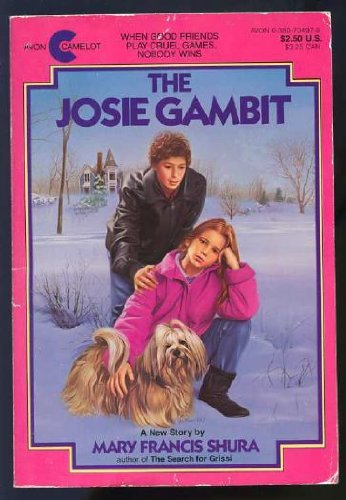Back in the summer, forces beyond my understanding compelled me to look up The Josie Gambit, a book I read in fourth grade or so. I remembered it as unsettling, with an ending that I didn’t quite get but nonetheless felt a bit grim. Maybe it was the ending that made the book stick in my head better than a lot of things I was reading at that age, who knows. But I would think about it now and again over the years, wondering if I should read it again, and finally I got the idea to check on the Internet Archive.
A note from Future Katherine!
I first wrote this post sometime in July. Just a couple of weeks before I finally hit the “schedule” button, the Internet Archive suffered a massive DDOS attack and was offline for days to fix the issue. The Internet Archive is an invaluable resource, and will probably only become more important as we stumble into an era of deepfakes and unreality. Please consider donating to support their work!
Of course, the juvenile mystery/thriller of your childhood is much less unsettling when you read it again as an adult. And honestly the jury’s out on whether this post will ever see the light of day, because discussing middle grade nostalgia reads seems like filler content.
Another note from Future Katherine! The time for filler content has come.
Our protagonist is twelve-year-old Greg, who’s spending the school year with his grandmother out in Idaho while his single mom travels for work. He’s long been friendly with the neighbor family, the Nolans, whose patriarch taught him how to play chess. Now his friend Josie Nolan is having a rough patch with her friend Tory. Things get weird and dramatic, Greg joins the school chess club, and he finally cracks the case of why Tory is acting so weird.
Reading The Josie Gambit now as an adult in 2024, it is immensely Of The 80s. Single moms! Divorce! Scandal over implied drug use! I mean just look at that cover!
But what sets it apart is Mary Francis Shura’s pitch perfect narrative voice for Greg and also the seriousness with which the book takes chess. Greg’s thinking about chess and observations of chess games is what helps him figure out why Tory is acting the way she is, and the narration is peppered with the kind of insights into chess strategy that you would expect from a preteen who was pretty serious about the game. There’s even an appendix (still written from Greg’s perspective) to explain the basic rules and mechanics.
I get now why I thought it was unsettling, but as an adult it’s not really the stuff of nightmares. A fun read if you come across it somewhere!

